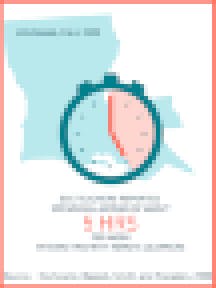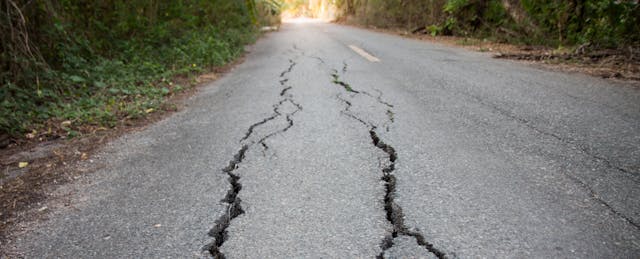The long-running pandemic has disrupted every facet of education. But the early childhood sector has been particularly devastated. Over the past 16 months, young children have experienced learning setbacks and fewer social experiences, while their educators have endured degraded working conditions, stress from job uncertainty and mental health declines.
Much has been reported, written, observed and said about these impacts—particularly by researchers. But to families, educators and early childhood leaders, that information can be convoluted, complex and overwhelming. In a crisis situation that has been fluid and demanding, costly and time-consuming, few of those who stand to benefit most from the studies and surveys conducted on the impact of the pandemic on the child care sector actually have the capacity to scour them, search for solutions and reflect on the readings.
In that spirit, a team of early childhood experts at the University of Michigan and the Urban Institute decided to do the sifting and sorting for others in their field. They synthesized the findings from 76 high-quality studies of the early care and education sector during the pandemic, including those conducted at the national, state and local levels.
What they learned largely reinforce the narratives that are already circulating about early childhood education during the pandemic: It’s clear that young children have suffered, perhaps with long-lasting effects, and that those who work with them find themselves facing unprecedented mental health and financial hardships. Yet to aggregate these findings and make sense of them, all in one place, provides a service to not only early childhood educators and families of young learners, but to policymakers, leaders and other people in positions of power, the authors argue.
“What was really remarkable here is just how consistent the evidence is, even though the effects are localized,” says Christina Weiland, associate professor and faculty co-director of the Education Policy Initiative at the University of Michigan, who co-authored the report, titled “Historic Crisis, Historic Opportunity.” “A lot of this is not very surprising. What’s new here is just being systematic.”
The Impact on Children
One near-universal finding of the studies that Weiland and her colleagues evaluated was the sharp decline in program enrollment during the pandemic, persisting well beyond the initial weeks and months of the crisis.

In many cases, lower enrollment likely translated to missed learning opportunities for children, lost income for child care program operators and less work for educators.
Explanations for the plummeting enrollment vary but are common across studies (and, by extension, geographic areas). Some families were fearful about the virus. Others, suddenly working remote or laid off, decided to keep their child with them at home. Still others just didn’t see the value in remote learning for such a young child. On top of that, many programs were strapped with group size restrictions and social distancing measures that forced smaller class sizes and lower enrollment.
With enrollment, as with so many other elements of the pandemic, the impact was not borne equally. Child care centers experienced greater enrollment losses than family- or home-based care providers, and those who un-enrolled were more likely to be from families who did not speak English at home, who reported lower incomes, or who identified as Black, Hispanic or Native American.
Perhaps unsurprisingly, the amount of time spent on learning activities each week declined as in-person teaching became either unsafe, undesirable or unavailable. This trend held even for the programs that offered remote learning during closures; in one study, families reported two hours of learning per day, down from about six in pre-pandemic schooling. In another, based on Louisiana, early childhood educators reported spending a median of five hours per week interacting with remote learners.

Data from 2020, and early evidence from the 2020-21 school year, suggest significant setbacks among early learners, with children of color as well as those from low-income backgrounds, who are learning English or who have a disability experiencing more pronounced setbacks. This affects not only academic outcomes, but social skills, emotional intelligence, interactions with peers and more. Many young children who have special needs may not have been identified as such, and as a result missed out on critical services they otherwise might have received.

The good news—there is some of that—is that smaller class sizes weren't necessarily a bad thing for children’s learning and development. They allowed those who could benefit from it the chance for greater individualized care and education. And outdoor learning, which many programs turned to when they first opened and were charting a “new normal,” has been shown to have enormous physical and psychological benefits for children.
Perhaps most importantly, families spent more time with their children. Many played a direct role in their child’s learning for the first time. According to the analysis, 80 percent of parents of preschool-aged children read to their children during the pandemic, 62 percent sang songs with them and 61 percent worked with them on numbers and letters at least three times per week. Those patterns were not isolated by race, region, ability or language, according to the analysis; all families reported participating in such activities with their children.
“As much as the pandemic has led to isolation and social deprivation, it’s also brought a lot of families closer,” said Phil Fisher, an expert in neuroscience and child development and the Philip H. Knight Chair and professor of psychology at the University of Oregon, during an online event to discuss the report.
“Not only were people saying that kids were relying more on their parents for emotional support,” Fisher added, “but parents were saying their kids were a source of emotional support for them, too, during the pandemic.”
As children and parents grew closer, families and educators formed their own bonds. Family engagement became critical.
“We know that families and schools need to be partners in supporting kids,” says Weiland. “This [pandemic] seems to have pushed the envelope on that.”
That partnership may have been a necessity during the pandemic, Weiland acknowledges, but she sees it as a silver lining.
“I hope what it’s done is reset parents’ and educators’ expectations about what is doable and normal around home/school connections,” she says.
The Impact on Early Childhood Educators
Child care centers and home-based providers, on the whole, were harder hit by the pandemic than programs embedded in public schools and those funded by the federal government’s Head Start.
The initial closures and subsequent uncertainty—regarding reopening guidelines, availability of federal relief, health and safety measures and more—led to confusion and worry. Providers were often not sure when they could reopen, how they were supposed to go about it and what requirements they were expected to follow once they did.
Many reported experiencing financial instability, income loss and an increase in the cost of care, due to restrictions on class sizes, price increases on food and cleaning supplies, the need for personal protective equipment, and greater demand for labor.
Though some providers received loans from the federal Paycheck Protection Program (PPP), others reported dipping into their savings or racking up credit card debt to afford the continued—and increasing—costs of operating.
“The financial stress and uncertainty, on top of the public health emergency, created challenging working conditions that made it difficult for young children and educators to thrive,” the authors of the report write.
Those challenging working conditions include abrupt schedule changes, new instructional formats and declines in mental health and wellbeing. Many also required additional training and professional development that covered remote teaching, proper sanitization, family engagement and bilingual communication, among other topics.
“The extra time spent planning, cleaning and distancing leaves me exhausted every day,” a Virginia educator shared.
“Because I’m in a place where I live upstairs … as soon as it crosses the threshold of my door … it’s there. We’re going to get it,” said one home-based provider in Arkansas who ultimately contracted COVID-19.
In short, the pandemic compounded the challenges of an already-difficult job. Many early childhood educators lack employer-sponsored health insurance, and the health and safety risks of COVID-19 left many fearful of their options. The frequent and prolonged closures, declines in enrollment and new guidelines around social distancing caused financial stress among providers and educators. For many, the ability to justify what they gain by working in early childhood education against the risks they assume each day became ever more tenuous.

These and other factors led early childhood educators to report being more anxious, overwhelmed and stressed, all of which they felt negatively impacted their ability to provide high-quality care and education to children. Symptoms of depression and other mental health conditions increased considerably among child care workers and preschool teachers during the pandemic, often without recourse.

The instability and constant flux of the job—unpredictable site closures due to positive cases, reduced hours, personal risk—caused higher-than-normal turnover in a field that already experiences a great deal of staffing challenges.
“Pandemic staffing challenges are likely to hinder recovery,” the authors write, and indeed, many providers have begun to report persistent program or classroom closures due to insufficient personnel.
A fall 2020 survey in Louisiana found that 90 percent of early childhood leaders experienced staffing challenges during the pandemic, and 64 percent were having a difficult time hiring the educators they needed for their program. “These leaders hypothesized that increased challenges of the job, coupled with continued low wages, were both a major driver of staffing challenges and likely to influence teaching quality,” the report explains.
What’s notable about nearly all of these findings, Weiland says, is that they don’t present new issues in the field. Rather, they expose or exacerbate challenges that existed before the pandemic.
“We had a very fragmented and unequal early care and education landscape already,” she said. “The pandemic has just magnified that.”


